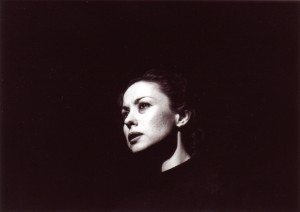Curriculum vitae
Her grandfather’s family came from Aivali, on the shores of Asia Minor, and her
grandmother’s from Mytilene, just off the coast. She was born in the port city of Piraeus, read Law at university and studied music. On graduating, she practised Law for a while, then spent many years as a translator with the European Union in Luxembourg and Brussels.
In 1998, by sheer coincidence, she met the story-teller Henri Gougaud, plunged deep into the world of fairy tales and have never surfaced since. Tales and their telling have brought her many gifts, amongst them unexpected meetings.
She have had seventeen books published (ten of them for children), as well as a CD with fairy tales.
Curriculum vitae 2
‘We come from an egg much smaller than a pin-head and live on a rock that revolves around a microscopic star that will one day collide with it.
But we are made of light and not just carbon, oxygen, shit, death and other such things; and in the end we have been here ever since someone was needed to gaze on the beauty of the universe.’
Εduardo Galeano
I was born near the sea, and they say that all those born close to its waves are made of soil and salt water. If this is true then I am indeed soil and salt water like all born by the sea; and besides that I am light and darkness, shit, dreams and stories, just like everybody else, wherever they were born.
I believe that life began when light was born of darkness and that true life started when a person – a man? a woman? – first told of the beauty of the world. From those days until now, when someone tells one of those old stories they call folk tales and speaks of the paths that lead from darkness into light they call him a story-teller and say that he has lost his wits, perhaps because he is on the side of life, on the side of innocence, on the side of the hero or the heroine that lifts their head towards the light from the bottom of the well.
How do those few crazy people who tell folk tales differ from the others? Could it be that after all they are not cannibals like the shrew in the folk tale of that name but are just like everybody else? Could it be that they are not Tearful Johns like the hero of another tale but are just like everybody else? The difference lies in that they know they are BOTH Shrews and Tearful Johns and CANNOT tell the tales of Tearful John and the Shrew unless they know it from inside.
What is their worst failing?They often talk too much and even more often -or perhaps always- get confused when they are searching for the truth. This why they are condemned to go on trying to untangle that muddled ball of thread by telling folk tales, stories, that is, that don’t waste words. And then more folk tales, and more and more, to save their souls.
In the language of the Gouarani indians ‘niee’ mans both ‘word’ and ‘soul’. The Gouaranis believe that those who tell lies or waste words are traitors to their souls.
In the realm of folk tales the stories are absolutely true, but they do not live in the visible world. They can only be seen when someone puts all his heart into the telling of them, and then only as long as he is speaking. Then they fly off in search of someone else to tell them from the heart and breathe life into them. Folk tales resemble angels bearing light, and this light shines on truths that are hidden in soil and sea water, in death, in shit and in dreams.
I am a story-teller. Folk tales are my food and my consolation. I fall asleep and wake with them, searching for tranquillity so I can step around the traps laid by the turbulent world – its fear, its foolishness, its boasting, its tolerance of begging, of any kind of begging, all of which lurk within me and those I am surrounded by -and sometimes show themselves.


 Greek
Greek